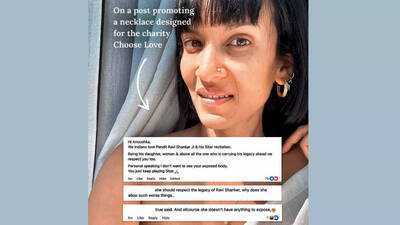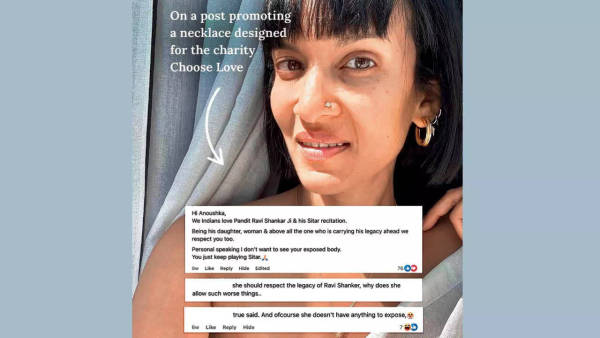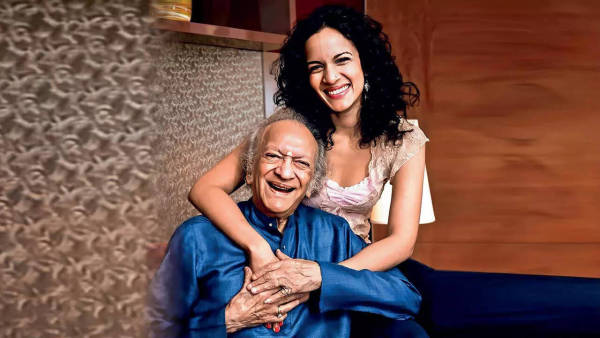
With 11 Grammy nominations so far, sitarist Anoushka Shankar has started to feel that she is Grammy ’s eternal bridesmaid . “By the time I win, if I ever do, I’d be like I don’t care anymore,” she laughs. As she celebrates 30 years of global touring since she made her debut at age 13, Anoushka feels that for the first time, a number means something. “It feels like I really had a life of music,” she says.
In Delhi for a private event, Anoushka takes us back to her Delhi days , what’s the deal with her and the Grammy, why turning 40 seems magical to her, and the unique bond she shared with her father, Pandit Ravi Shankar .
‘The idea of ‘what will your father think’ implies that you are inherently wrong, shameful or bad’
Anoushka was recently subjected to many sexist comments on her posts. While some equated her appearance with her music and how her new haircut didn’t go with the classical music that she practices, others questioned if it affects her father’s legacy. “There are so many aspects to this – one is the inherent patriarchal thinking that we, as women, somehow reflect the reputations of our male family members, as opposed to being individuals or humans. That’s one messed up baseline which comes back in many different ways. And that has to go,” she says.

“For me, that is something I had to work on my whole life because it was in my music. People were constantly seeing my music as the reflection of my father’s music… I am not my father’s music… I had to do a lot of work to be comfortable with that. Ultimately, my father would want me to be a happy and fulfilled being more than for me to be copying what he did. The other important element is shame. And that is more insidious because people think they can hit you by tapping a ‘shame button.’ The idea of “what will your father think” implies that you are inherently wrong, shameful, or bad. But if we do the work to strip shame from bodily autonomy, sexuality, physical appearance, and pleasure, then it no longer affects us – because it simply doesn’t hit the ‘shame’ button anymore,” Anoushka explains.
‘GRAMMY IS NOT A REFLECTION OF MY WORTH AS A PERSON OR AN ARTISTE’’
Anoushka Shankar has been performing for 30 years now. And she also has had two recent Grammy nominations. When asked what’s the deal with her and the Grammys , she says, “I am like the Grammy’s bridesmaid ( laughs ). By the time I win, if I ever do, I’d be like ‘I don’t care anymore.’ I have done so much therapy,” she laughs again, and adds, “There are so many incredible artistes who haven’t won and it does not make them less incredible. So, I look at them and remind myself that it doesn’t matter. And as the years go on, these things become more and more networkdriven, so when you see some of the people winning, you say you have been lobbying this whole time. And it is like if that is what it takes then that is not what my music time is about. I have got an actual job of playing for people and making music from my heart and I don’t want to spend my whole career shaking hands with people and going to receptions in order to win something.”
Talking about the lack of a win, she muses,“I can pretend that it doesn’t matter, it can feel disappointing and I have to keep coming back to this – that this is not a reflection of my worth as a person or an artiste. It is purely a commercial benchmark. A new title. But if you have also had 11 nominations, that shows you have a really long-standing successful career and a body of work that is connecting with people and I feel that also matters.”
 ‘THERE ARE PLACES I LIKE TO REVISIT IN DELHI BUT IT HAS CHANGED SO MUCH’
‘THERE ARE PLACES I LIKE TO REVISIT IN DELHI BUT IT HAS CHANGED SO MUCH’
After a day out with friends, Anoushka returns to Khan Market, once her neighbourhood haunt, to meet us. She exclaims, “It is an ‘old-home city’ for me…” She adds, “There are places I like to revisit but it has changed so much. I still go to Khan Market because that was my neighborhood. I love the feeling there –walking around and visiting the Lodhi Gardens.” She tells us that she will be back to the city soon. With Chapter III: We Return To Light , the final part of a trilogy of mini-albums that was released in March, the musician hints that they will be announcing something very soon. “So, all of my music is about finding that light, moving towards that light, whatever it may be,” she adds.
'My childhood and teens were about assimilating, trying to catch up, and faking it - all of which only cracked open in adulthood’
For someone whose parents came from different parts of India and with homes in India-England-America, Anoushka points out that identity was always tricky for her.
“Culture shock happened in so many different ways. It is not even the standard story of a diaspora where I am Indian and I grew up mainly abroad. My parents were from two different parts of India. They got married when I was seven. So first, I was raised as a South Indian and then suddenly Bengali culture came into my life. But that is also when we moved to Delhi. In Delhi, North Indian culture came into my life and then we moved from England to America so I had that shift from British culture to American culture and all of it was swirling around without any kind of single strand to hold onto. My childhood and teens were about assimilating, trying to catch up, and faking it - all of which only cracked open in adulthood.”
 With 11 Grammy nominations so far, sitarist Anoushka Shankar has started to feel that she is Grammy ’s eternal bridesmaid . “By the time I win, if I ever do, I’d be like I don’t care anymore,” she laughs. As she celebrates 30 years of global touring since she made her debut at age 13, Anoushka feels that for the first time, a number means something. “It feels like I really had a life of music,” she says.
With 11 Grammy nominations so far, sitarist Anoushka Shankar has started to feel that she is Grammy ’s eternal bridesmaid . “By the time I win, if I ever do, I’d be like I don’t care anymore,” she laughs. As she celebrates 30 years of global touring since she made her debut at age 13, Anoushka feels that for the first time, a number means something. “It feels like I really had a life of music,” she says.

